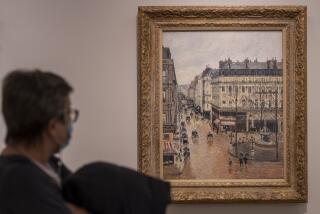Austrian Decision Ends Hopes for Restitution on Klimt Works
A decision by the Austrian government this week dashed the hopes of a Los Angeles resident that restitution might finally be made to her family for art plundered by the Nazis during World War II. The collection included several important paintings by artist Gustav Klimt, and has been valued at $100 million.
After a decision in December by Austria’s parliament providing for the return of Jewish-owned artworks seized by the Nazis, Maria Altmann, 83, had hoped that she and other heirs might finally receive some compensation for the art collection that once belonged to her late uncle, onetime sugar magnate Ferdinand Bloch-Bauer, who lost his business to the Nazis and lived in exile in Zurich. The works are now housed in various Austrian museums.
The most valuable item in the collection is Klimt’s “The Portrait of Adele Bloch-Bauer,” 1907, one of the artist’s celebrated “gold” paintings. Adele Bloch-Bauer, Ferdinand’s wife, was a patron of Klimt. The painting is thought to be second in importance only to Klimt’s ubiquitously reproduced painting “The Kiss.”
On Monday, the Beirat, an advisory board to the Austrian minister charged with returning the plundered property, issued a statement saying that there is no possibility of restitution under the given law to Bloch-Bauer’s heirs for five Klimt paintings--two portraits and three landscapes--now housed in the Austrian Gallery in Vienna.
The family will get back 16 drawings by Klimt and 19 pieces of classical Viennese porcelain; those works have an estimated total value of between $500,000 and $1 million. The future of an additional Klimt painting remains undecided.
Los Angeles attorney E. Randol Schoenberg, who represents Altmann, said that the Austrians’ decision to keep the paintings is based on wishes expressed in writing by Ferdinand and Adele Bloch-Bauer that the artworks should one day be donated to Austrian museums. Schoenberg says that since those wishes were expressed before World War II, they would clearly have changed following the Nazi persecution of the Jews. “To argue that Ferdinand and Adele would have wanted this is to be a Holocaust denier,” he said.
Schoenberg said he believes that, in Altmann’s case, the law is being “selectively applied” to allow the most valuable of the family’s artworks seized by the Nazis to remain in Austria.
“The hope was very high, initially, that restoration in Austria could lead to similar legislation throughout Europe. This development, of course, is a tremendous setback to those hopes,” Schoenberg said.
The December law has resulted in the return of some artworks to their original owners. In July, the Rothschild collection of Old Master paintings, as well as coins and armor, valued at more than $25 million, was returned to heirs in the United States and Austria, and is to be auctioned July 8 by Christie’s in London, according to Schoenberg.
Altmann, reached on vacation in Vancouver, called the decision about the Klimt paintings “infuriating.” “Everything on which they based their decision is wrong, and a lie,” she said. “I wouldn’t be so furious if they had based it on something that was right. But what they say is wrong, false and devious.”
Austrian consul general to Los Angeles Werner Brandstetter said that he would have no comment.
More to Read
The biggest entertainment stories
Get our big stories about Hollywood, film, television, music, arts, culture and more right in your inbox as soon as they publish.
You may occasionally receive promotional content from the Los Angeles Times.









